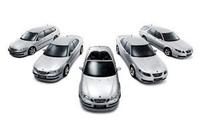Saab’s entire range goes flex-fuel
 With the arrival of the 1.8t BioPower engine across the Saab 9-3 range, Saab is proud to become the first, and only, car company in the UK to offer an alternative fuel engine choice in every single model in its line-up. Available in all three 9-3 bodystyles of Sport Saloon, SportWagon and Convertible, Saab’s pioneering BioPower flex-fuel engines are now available to a whole new audience of customers in the UK.
With the arrival of the 1.8t BioPower engine across the Saab 9-3 range, Saab is proud to become the first, and only, car company in the UK to offer an alternative fuel engine choice in every single model in its line-up. Available in all three 9-3 bodystyles of Sport Saloon, SportWagon and Convertible, Saab’s pioneering BioPower flex-fuel engines are now available to a whole new audience of customers in the UK. The 1.8t BioPower engine emits 50-70 per cent less carbon dioxide (CO2) than its 1.8t petrol engine equivalent, yet produces 17 per cent more maximum power and ten per cent more torque when running on the eco-friendly yet potent fuel source bioethanol E85. It is the third Saab BioPower engine to be launched in the UK. Two Saab 9-5 BioPower variants are already for sale here, both offering significantly reduced fossil CO2 emissions and substantially increased power and performance.
“The success of the 9-5 BioPower has encouraged us to extend this concept to the 9-3 range,” says Jan Åke Jonsson, Saab Automobile’s Managing Director. “This means we can now offer BioPower variants throughout our core product line-up.” Indeed, on the back of the success of the Saab 9-5 BioPower range of cars, Saab is already the biggest-seller of flex-fuel cars in Europe. The launch of 9-3 BioPower at the Geneva Motor Show this week promises to extend Saab’s leadership in this emerging and exciting segment.
Saab 9-3 BioPower models will be available with manual or automatic transmissions, and will go on sale with immediate effect in the UK and Ireland and other Nordic markets. Sales in other European markets will commence later this year.
Saab 9-3 1.8t BioPower:
Running on bioethanol E85 fuel (85% bioethanol/15% petrol), the new 9-3 BioPower 1.8t engine delivers 17 per cent more maximum power (175 hp/129 kW v 150 hp/111 kW) and ten per cent more torque (265 v 240 Nm). In the 9-3 Sport Saloon, that translates to projected zero to 62 mph acceleration in 8.4 seconds and 50 to 70 mph in fifth gear in 13.9 seconds, compared to 9.5 seconds and 15.0 seconds, respectively, on petrol.

